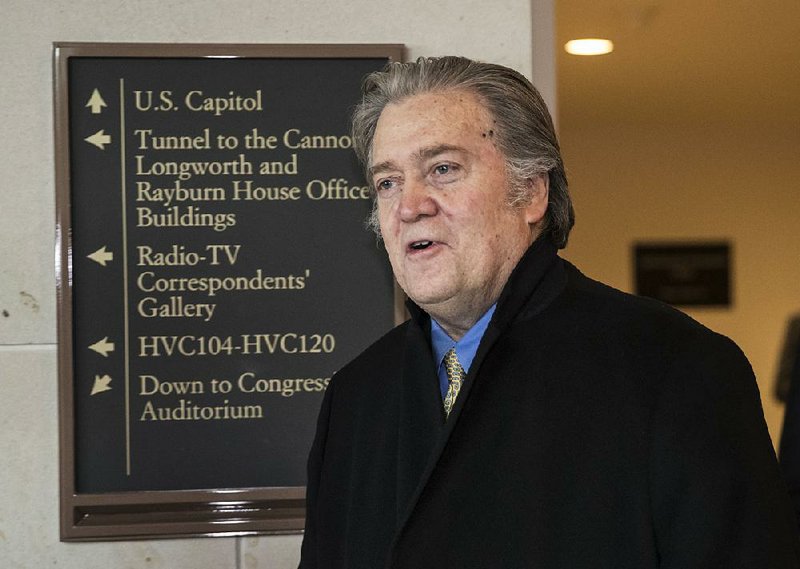WASHINGTON -- House Republican leaders are weighing "further steps" to force former top White House strategist Steve Bannon to answer investigators' questions in their probe of Russian meddling in the 2016 election -- including potentially declaring him in contempt of Congress -- after a Thursday interview they called "frustrating."
Bannon spoke with the House Intelligence Committee under a subpoena the panel issued on the spot last month, when he refused to answer questions related to the transition period and his tenure in the White House.
On Thursday, Bannon presented panel members with a list of 25 questions that he would be willing to answer from that time period. But according to the panel's top Democrat, Rep. Adam Schiff of California, the questions had all been "literally scripted" by the White House, and his answer to all of them was "no."
When the committee tried to push Bannon to answer questions that were not on his list, he repeatedly told members that the White House had not authorized him to engage on those queries. At no point, people familiar with the interview said, did Bannon voluntarily elaborate on his answers.
[PRESIDENT TRUMP: Timeline, appointments, executive orders + guide to actions in first year]
The intelligence panel's investigation is not supposed to overlap with the objectives of Mueller's investigation, but several events and people are common to both efforts. Bannon has not yet met with the Senate Intelligence Committee in its probe of Russian meddling in the election.
But in the House, Republicans and Democrats alike have been angered by Bannon's repeated attempts to dismiss questions based on a claim to executive privilege that Trump never formally invoked, even when served with a subpoena.
Intelligence Committee member Michael Conaway, R-Texas, said Thursday that he, House Speaker Paul Ryan, R-Wis., and a few others would decide whether to accept Bannon's legal arguments against answering the panel's questions or take punitive measures such as declaring him in contempt. The decision-makers will not include the panel's chairman, Devin Nunes, R-Calif., Conaway said.
When asked if he was personally ready to issue a contempt citation for Bannon, Conaway said: "I think he should answer our questions."
Republican leaders are not expected to decide on a course of action until late February, after they return to Washington after a one-week recess, he said.
Schiff, however, demanded that the committee move to hold Bannon in contempt as soon as possible.
"I think contempt is the only road left open to us," Schiff said.
Bannon's return to the committee was scheduled and delayed three times while the White House hammered out the terms of the interview with the House counsel.
On Wednesday night, the White House sent the committee a letter outlining its argument for why executive privilege could apply to the transition period, according to panel members. But lawmakers said that letter was not a formal invocation of executive privilege, and they continue to reject the premise that privilege can apply to the transition period, when President Donald Trump was not in the Oval Office.
Panel members on both sides of the aisle also stressed that Bannon could not cite nonexistent privilege as an excuse to avoid their questions.
"That's not how privilege works," Schiff said. "That's how stonewalling works."
It is not clear what type of contempt the committee could seek to declare against Bannon, if Republican leaders choose to pursue that path at all. Should they decide to seek a contempt citation, a vote in the House Intelligence Committee would first be required before the case would be transferred to the courts.
If Bannon does not settle with the committee, the matter could linger in the courts far beyond the committee's projected schedule to wrap up its Russia probe. That, Schiff surmised, could be "part of the White House stratagem."
"They have decided they want to stop our committee, and they hope to draw this out long enough," Schiff said.
A Section on 02/16/2018
